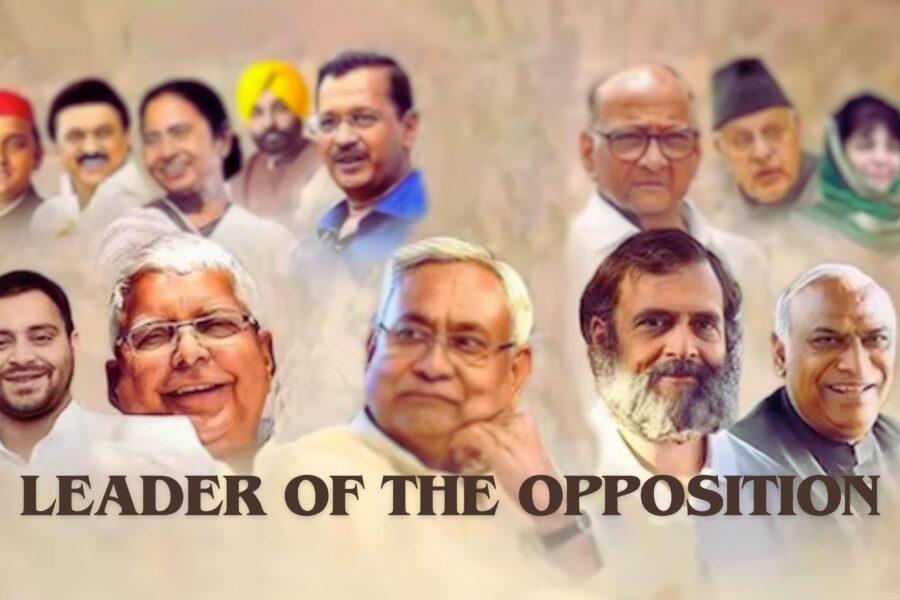Introduction
This article deals with the history and legal standing of the Leader of the Opposition in India. It explores how this position came to be formally recognized and the criteria for a party to have its leader designated as such. It also examines the key responsibilities of the Leader of the Opposition and the ongoing debate surrounding the need for a constitutional amendment to solidify this role.
Leader of the Opposition
Although the post was also held by Motilal Nehru in the former Central Legislative Assembly of British India, it was officially recognized in 1977 by the Salary and Allowances of Leaders of Opposition in Parliament Act (herein after ‘The Act’), which defines a “Leader of the Opposition” as a member of either the Lok Sabha or the Rajya Sabha who is currently the Leader of the House of the Party in Opposition to the Government with the greatest numerical strength and who is acknowledged as such by the Speaker or the Chairman of the Rajya Sabha.
According to the Act, which gave the position formal and statutory status, the speaker and chairman of the house, respectively, determine the necessary majority. In the event that the lower house of parliament lacks a recognized leader of the opposition, the main opposition party’s leader will be appointed as a member of the selection committee under Clause 4 of The Central Vigilance Commission Act, 2003.
Criteria for being recognised as the Leader of the Opposition
The first Lok Sabha Speaker, G V Mavalankar, stated that the opposing party in question had to have at least 10% of the total strength of the house in order to receive informal recognition in either the upper or lower houses. Individual parties, not coalitions, have necessary requirements to reach the 10% seat condition.
Later, the Speaker of the Lok Sabha, The Leaders and Chief Whips of Recognized Parties and Groups in Parliament (facilities) Act of 1998, and the Leaders themselves incorporated this point into Direction 121 (1) of the Directions.
With the adoption of the Tenth Schedule to the Constitution, which recognizes even one-member parties as legislative parties, it is no longer necessary.
Tasks of the Leader of the Opposition
One of the many responsibilities of the Leader of the Opposition is to preside over sessions where the opposition primarily debates policy, courses of action, and bill analysis. This aids in presenting the administration with alternative policies as well. The selection of opposition members by different shadow ministers is one of the other jobs.
The Deputy Leader of Opposition designates the second chairperson for the official opposition party in the house. A shadow minister is also someone who serves as the Deputy Leader of the Opposition. Although it is neither an official position or one defined by the constitution, it nevertheless exists to give the opposition party in government political stability and strength.
Requirement for a Constitutional Position for the Leader of the Opposition
In the present Indian political system, the government seems legally bound to consult the leadership of the opposition in the selection of a number of crucial posts, such as the chief vigilance commissioner and the chief of the Central Bureau of Investigation (CBI). This can be seen through the example of Anoop Baranwal v Union of India (2023). In this case, a Constitution Bench of the Hon’ble Supreme Court of India expanded the composition of the body appointing the Chief Election Commissioner to include the Leader of the Opposition besides the Prime Minister and the Chief Justice of India. This mechanism will be operational till the time the Parliament enacts a law in this regard.
Some laws specify the function that the leader of the opposition must play, even though it is not a constitutionally mandated position. This appears to go against the other criterion, which states that a party with less than ten percent of the seats in Parliament cannot have the leadership of the opposition.
It is evident that India has a complex and inconsistent legal framework regarding leadership of the opposition. But their interpretation and clarification ought to guarantee the existence of an opposition leader at all times. Denying the opposition’s leadership to the second-largest party in Parliament creates a bad precedent and weakens democracy. A powerful opposition is necessary to check the power of the ruling party as dissent is extremely important for mature democracies to function properly.
Conclusion
India’s legal framework regarding the Leader of the Opposition presents a complex picture. While some laws acknowledge their role, the lack of a constitutional mandate creates inconsistencies. This article argues for clear and consistent legal recognition of the Leader of the Opposition. A strong opposition is essential for a functioning democracy, and a designated leader plays a vital role in holding the government accountable and presenting alternative viewpoints. Ensuring a clear legal framework for this position will strengthen India’s democratic processes.
Saachi Minocha (Legal Intern)


Their international health workshops are invaluable.
generic lisinopril without rx
The best choice for personalized care.
Always greeted with warmth and professionalism.
buy generic clomid without prescription
I trust them with all my medication needs.
Commonly Used Drugs Charts.
buying cheap clomid
This pharmacy has a wonderful community feel.
Cautions.
how to get cheap lisinopril without dr prescription
The free blood pressure check is a nice touch.